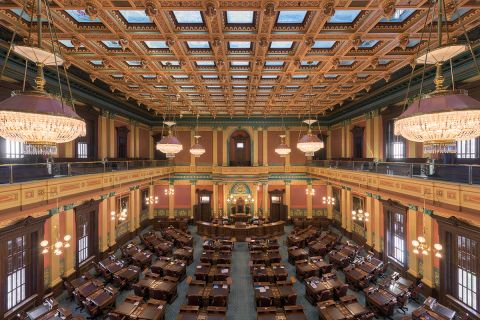LANSING—Would a recently launched Michigan ballot proposal increase or decrease term limits for state lawmakers?
It depends on how you look at it.
Voters for Transparency and Term Limits — a bipartisan petition group seeking to amend the state Constitution — rightly notes that the measure reduces the overall length of time an official can serve in the Legislative Assembly, by 14 years. at the age of 12.
Related:
But supporters of Michigan’s current term limits law say the ballot measure would allow lawmakers to serve longer in the chamber to which they are elected. This too is correct.
Under Michigan’s current term limits rules, established in 1992, state legislators can serve up to six years, or three two-year terms, in the House, and up to eight years, or two four years in the Senate. A legislator who reaches the term limit in one chamber may elect to run in the other chamber.
Not everyone is in favor of the current term limits. In 1992, the Term Limits Act was approved by 59% of voters, while the remaining 41% voted against.
Critics of the current term limit rules have argued that relatively short terms in the House or Senate prevent lawmakers from developing real expertise before they have to leave. Senate Majority Leader Mike Shirkey, R-Clarklake, said in 2019 that he would like to eliminate or lengthen term limits, arguing that elections serve as a “natural term limits”.
The proposed constitutional amendment would replace that system and instead allow a future legislator to serve a maximum of 12 years in the House or Senate. Incumbents in the current legislature would be excluded from this rule, but allowed to serve the maximum number of years in their respective chambers.
Additionally, the proposed ballot measure would subject elected officials across the state — such as the governor, lieutenant governor, attorney general, secretary of state and lawmakers — to stricter financial disclosure rules. personal.
Supporters of the petition argued that the proposal would strengthen transparency laws in Michigan and create a standardized cap on legislative terms. According to them, the overall cap of 12 years lowers the current maximum of 14 years combined between the two chambers.
“Our belief is that imposing a limit in number of years is simpler, it’s direct and would impose a standard that is the same for everyone, and (the limit) will be lower in total”, spokesperson for the Joshua Pugh campaign said in Bridge Michigan after the state Board of Solicitors approved the petition summary and its format on Wednesday.
But opponents say the petitioners are “misleading” voters by arguing that the measure lowers the cap on legislative terms. Critics argue the proposal would allow members of the House and Senate to serve nearly double their current term, giving incumbents more time to gain political influence and allowing former lawmakers who have been fired to stand again for their previous position.
“We and the majority of Michigan citizens are going to be against repealing the current term limits and replacing them with one that would allow current legislators to serve up to twice as long and former legislators to return,” Patrick Anderson , who helped draft the language of the current term limits laws in 1992, Bridge said on Wednesday.
Michigan’s overall 14-year cap is already among the strictest in 15 states with legislative limits, according to the National Conference of State Legislatures. Those who support the ballot measure argue that the current rules force lawmakers to constantly plan their next gig and have resulted in high turnover in the Legislative Assembly, while the petition would allow incumbents to stay in a single chamber longer and concentrate on their work.
The proposed 12-year term limits would mirror the systems in California and Oklahoma. Mark Gaffney, co-chair of the petition group, told the Council of Canvassers on Wednesday that the goal was not to “revoke” term limits as Anderson argued, but to produce “better lawmakers.”
“We would have better lawmakers in this setup,” Gaffney said Wednesday. “I believe this proposal maintains term limits. Overall, it changes the total time that can be served, it allows more time in a chamber, and it changes formulas, but the actual number of years legislators can serve is reduced.
But critics say the turnover is exactly the purpose of term limits – to create more opportunities for newcomers.
“Term limits ensure that there’s a vacancy every now and then…so people run into those incumbents at those intervals,” said Scott Tillman, national field manager for US Term Limits.
The petition would give incumbents more benefits as their time in the chamber increases, making it harder to expose corruption, he argued. The reason lawmakers, staffers and consultants are coming forward against former House Speaker Lee Chatfield, who is being investigated over sexual assault and impropriety charges financial, Tillman said, is that Chatfield is no longer in power.
“Nobody covers up their boss’ corruption because their boss is going to disappear,” Tillman said. “You will still have corruption, but it will be revealed very quickly.”
Kurt O’Keefe, a bankruptcy attorney who is working with Tillman and Anderson against the petition, told Bridge the measure would not produce “better lawmakers” as Gaffney argued.
“You won’t get better legislators,” O’Keefe said. “You’ll have the same lawmakers twice as long in the House.”
Tillman and O’Keefe told Bridge that they were both members of “Don’t Touch Time Limits,” a Michigan coalition that toured the state in support of term limit rules with a giant pig sculpture in 2019. The coalition did not form a ballot issues committee, but Tillman suggested Wednesday that he could start raising money to campaign against the ballot measure.
“I’ll probably go to US Term Limits and ask them if they’ll be willing to help us fundraise,” Tillman said.

